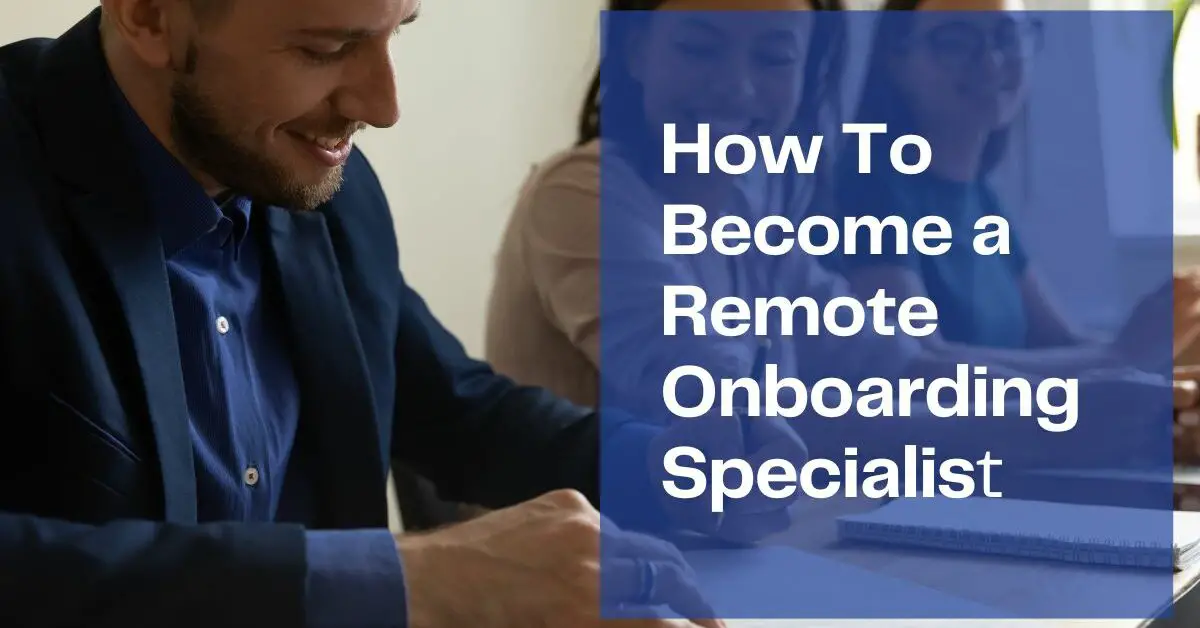While there are various careers for remote workers, one of the most common ones is remote onboarding specialist. As a remote onboarding specialist, you will work remotely with a startup from its first day. Although the job description might seem simple, there are quite a lot of duties that a remote onboarding specialist has to perform. On top of this, an easygoing personality and good English writing skills are key to success in this role. Therefore, if you’ve ever wondered what it takes to become a remote onboarding specialist and you think the job is an ideal match for your skill set, this article can help you head down that career path by showing you how to become a remote onboarding specialist, what to expect on the job and how much you can earn.
What Is a Remote Onboarding Specialist?

A remote onboarding specialist is a person who helps new employees get acclimated to their new jobs. They help new hires understand how to do their job and also help them adjust to the culture of the company they work for.
As a remote onboarding specialist, one of your primary duties is ensuring new employees get the information they need to do their job properly. They are often hired by companies that want to hire remote workers from other countries or those with employees working abroad and want to provide them with the best possible support. A remote onboarding specialist can be a manager or an HR representative, but it’s more likely they will be an employee who has already been through this process.
Everything You Need to Become a Remote Onboarding Specialist.
Although you don’t need any specific degree or qualification to become a remote onboarding specialist; however, you need to have some skills, experience and qualifications to make the job a little easier and more productive. To become a remote onboarding specialist, you will need;
- To become a remote onboarding specialist, you will need experience working in HR or recruitment roles. You can also gain this experience by studying for a qualification such as an MBA (or similar) degree or professional qualification in HR or business administration. You’ll also need excellent communication skills to build relationships with your new team members and help them feel welcome when they join your company’s team.
- You also need to have a high level of maturity and emotional intelligence. They should be able to work under pressure and when there is a lot of stress. They need to have the ability to communicate with people from all over the world, and they must be able to work on their own.
- People who want to become remote onboarding specialists will also need to have great customer service skills and be able to deal with problems that arise during the onboarding process. They will also need strong communication skills because they will have to communicate with customers through emails, phone calls or other forms such as instant messaging applications such as Skype or WhatsApp.
- They need to understand your company’s mission statement, values, goals and objectives well.
- An understanding of how your company operates on a day-to-day basis
- Experience conducting interviews with potential employees or candidates for promotion within your organization
- A degree in business administration, human resources management, or other related fields from an accredited college or university might also get you on the right track.
- Online training, courses and certification on websites like Coursera, Udemy, Udacity and Alyson might also be an excellent way to get started.
Most Important Skills Do You Need to Be a Remote Onboarding Specialist?
- To Succeed in your role as an onboarding specialist, you need excellent communication skills and empathy for people who are new in their jobs or environments. You need to be able to communicate well( both verbally and written) so that the new employees can get up to speed with their jobs as quickly as possible. This way, they can become productive members of your team as soon as possible.
- You also need good organizational skills so that you can keep track of all of your interactions with new hires.
- You also need strong listening skills because new employees might have questions that need answering or issues that need resolving during your interactions with new hires.
- Good working knowledge of computers, software, and technology in general. This is because they will have access to technology such as computers, laptops, tablets etc., which are used for creating websites and developing applications for different types of businesses.
- A natural ability to multitask and work efficiently while maintaining quality standards.
- As an onboarding specialist, the ability to solve problems and provide solutions would be an added advantage to your portfolio. Solving problems quickly is a great asset for any role, especially remotely.
Remote Onboarding Specialist Job Description
The job description of a remote onboarding specialist may vary depending on the company’s needs, but they usually include:
- Helping new hires get acquainted with their role and responsibilities
- Providing resources to help them complete their tasks
- Assisting with any questions they may have regarding their tasks
- Providing training on the platform and other required tools, such as Slack or Google Docs.
- Providing support during the onboarding process, including troubleshooting issues that arise.
- Helping new hires get comfortable using the company’s software and making them feel welcome in their new role.
- Introducing new employees to the company culture
- Emailing or calling new employees before their first day
Types of Remote Onboarding Specialist
There are different types of remote onboarding specialists which include
1. Onboarding Specialist
This type of remote onboarding specialist is a person who has been specifically trained to help new team members get started and learn the basics about their new role. You might find that this person is also a mentor for new team members as they learn more about the company culture, processes and technology.
2. Customer Success Manager
A CSM can also take on this role if your company relies on customer service or sales teams to assist customers. They are responsible for helping customers with their problems and troubleshooting issues so that they can be resolved quickly. The CSM will also provide support and guidance to new hires who may need extra help getting started in their new roles.
3. Training Specialist
If you’ve got many new employees in the company, training specialists can help them get up to speed quickly. These professionals have experience working with people who are learning about your products or services for the first time, so they know how important it is for people to feel comfortable before moving forward with their job responsibilities
4. software onboarding specialists:
They are software engineers who have taken the time to specialize in new hire onboarding. These specialists have a deep understanding of customer experience. They can help you improve your new hire onboarding process by providing the tools you need to ensure your employees have everything they need to succeed in their first few weeks on your team.
Some FAQs about remote onboarding specialists
1. What does a Remote Onboard Specialist do, and how much does it pay?
A remote onboarding specialist is an individual who specializes in the process of onboarding new employees. This includes everything from preparing them for their first day at work to helping them navigate the company’s policies and procedures. According to Zip Recruiter the average hourly pay for a Work From Home Onboarding Specialist in the United States is $27.76 an hour. While the estimated total pay for an Onboarding Specialist, according to Glassdoor is $60,586 per year in the United States area, with an average salary of $48,763 per year.
2. What is the best way to start my career as a Remote Onboard Specialist?
The best way to start a career as a remote onboarding specialist is through training and experience. For training, you might need to get a bachelor’s degree in business administration or human resources management from an accredited college or university. You may also consider taking on-the-job training courses like those offered at Coursera. Getting an internship at an entry-level position will also be an added advantage.
3. Why should I become a remote onboarding specialist?
Becoming a remote onboarding specialist can be one of the most rewarding careers you’ll ever have. You’ll spend your days helping others get acclimated to the workplace and learning from them. Your job will also give you plenty of flexibility, allowing you to work from home or wherever there’s an internet connection available. This could be perfect if you’re looking for part-time work or something that’ll let you take breaks throughout the day!
4. Do I need a degree to become a remote onboarding specialist?
You don’t need a degree to become an onboarding specialist. Although having one will be an added advantage. Most companies expect that you have minimum experience and the skills required, which can be gotten from online training platforms and internships.
5. What is the job outlook for remote onboarding specialists?
The job outlook for remote onboarding specialists is good. According to the Bureau of Labor Statistics (BLS), open jobs for this occupation are expected to increase by 15% over the next ten years. In addition, the BLS projects that there will be almost 300,000 more job openings in this field by 2024 than in 2014. Because of these numbers, becoming a remote onboarding specialist could be a good choice for professionals looking for career advancement opportunities.
Conclusion
Becoming a remote onboarding specialist can be a great career move if you have the skills and experience to back it up. The job pay is pretty decent, and it doesn’t require a ton of schooling or experience. It also allows you to live practically anywhere in the world, as long as you have technology and internet access. To be successful in this career, it’s important to understand the fundamentals of customer service and use proven methods. It’s also a lot of work, and while the pay is pretty good, it’s not a job that you can take on part-time. You should also specialize in one area (with previous experience) or have some schooling or training. Finally, you’ll need to keep up with industry trends and stay abreast of the latest tools used in your industry.






